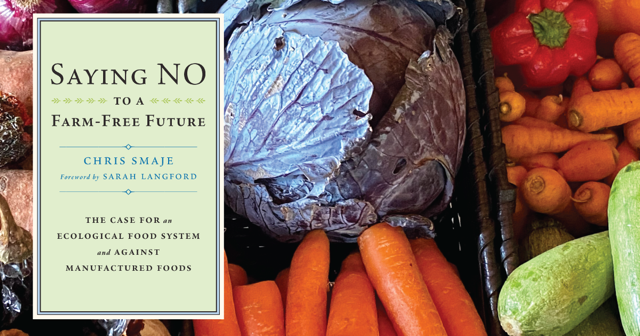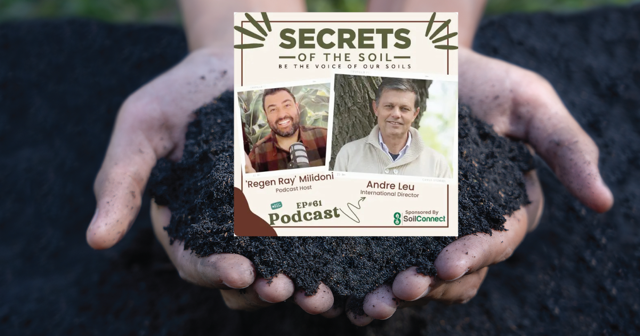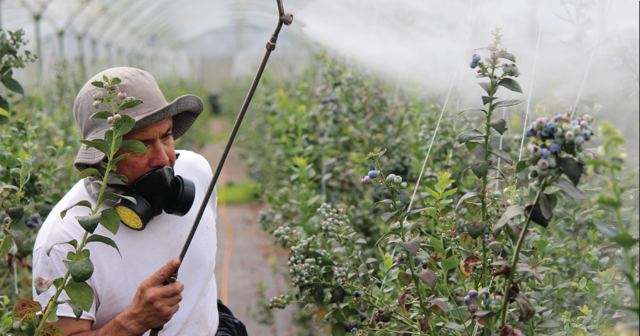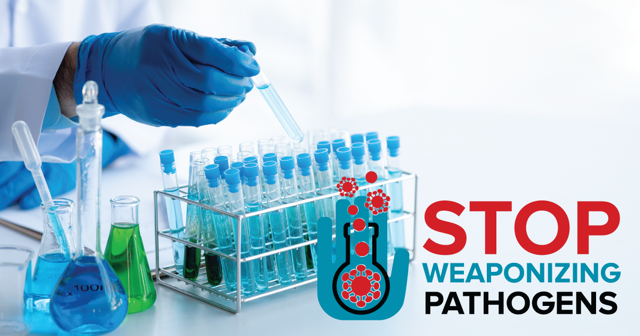
REAL FARMS, NOT FAKE FOOD
Saying NO To A Farm-Free Future: The Case For Agrarian Localism
Chris Smaje writes:
“I wrote the book in a two-month blur as a job of work that I felt somebody had to do to combat the head of steam building around the case for a farm-free future associated with George Monbiot’s book Regenesis and the Reboot Food initiative. And if that somebody was me, so be it.
My original motivation was mainly just to critique the fanciful ecomodernism of Reboot Food, which I believe is apt to bedazzle people of goodwill but with limited knowledge of food and farming into thinking that a technological solution is at hand that will enable them to continue living high-energy, urban consumerist lifestyles while going easy on the climate and the natural world. Really, it isn’t. The danger is that farm-free bromides will, as usual with ecomodernism, instil a ‘great, they’ve fixed it!’ complacency at just the time when we need to jettison the techno-fix mentality and radically reimagine our social and political assumptions.
So the book takes a somewhat polemical approach in critiquing the arguments for manufactured food. But actually I found that this provided a pretty good foil for making an alternative case for agrarian localism, what I call in my book ‘a predominantly distributed rural population, energy restraint, diverse mixed farming for local needs, wildlands, human-centred science, popular smallholder democracy and keystone ecology’. So the book has that more positive framing too, much of which will be familiar to regular readers of this blog or of my previous book, although I like to think I’ve pushed a few things forwards. Still, it’s a short book, so a more detailed exposition awaits.”
Read more: Saying No to a Farm-Free Future
This book is another fabulous Chelsea Green publication. Saying NO to a Farm-Free Future: The Case for an Ecological Food System and Against Manufactured Foods, will be published on July 20th. You can pre-order it now!
Say no to synthetic food! We need a regenerative future. We need real farms, not fake food!
Take Action Today: Tell Congress: Fake Meat Needs Safety-Testing, Just Like All GMOs!

REGENERATION INTERNATIONAL
The Power of Photosynthesis: RI on the Secrets of the Soil Podcast
André Leu, international director of Regeneration International, joined ‘Regen Ray’ on the Secrets of the Soil podcast last week. On the podcast, André explains how regenerative agriculture systems utilize the synergistic power that comes from biodiverse ecosystems. This knowledge fundamentally changes how we look at agriculture; Instead of competing for resources, the organisms within an ecosystem—such as plants, animals (including humans), and fungi—can work together to create a diverse and interconnected nutrient trade network. Plants use this network to exchange carbon-rich root exudates for the water, nutrients, and minerals that they need.
This interconnected trade network builds soil health and increases soil microbial diversity, which results in a highly productive and carbon-negative agricultural ecosystem. The services that regenerative farmers provide to the planet are massively important: ecosystem repair, reversing climate change, increasing biodiversity, revitalizing local economies, replenishing aquifers, and regenerating health.
Listen to the The Power of Photosynthesis Episode of the Secrets of the Soil Podcast Here
Looking for more Podcast episodes about Regenerative Agriculture? Check out the Regeneration International Podcast Here

GAIN-OF-FUNCTION
Lab-Created Bird Flu Virus Accident Caused by Risky ‘Gain of Function’ Research
USA TODAY reports:
“This exclusive article is adapted from former USA TODAY investigative reporter Alison Young’s forthcoming book “Pandora’s Gamble: Lab Leaks, Pandemics, and a World at Risk,” which will be released April 25. In this excerpt, Young reveals for the first time details of a December 2019 lab safety breach involving one of the world’s most infamous lab-created “gain of function” viruses – and the efforts that were made to downplay the event, avoid notifying health authorities and oversight bodies, and keep the public and policymakers in the dark.
Inside the high-security Influenza Research Institute at the University of Wisconsin-Madison, two experienced scientists were pulling ferrets out of their HEPA-filtered cages on a Monday in December 2019. Another researcher, still in training, was also in the room to watch and learn.
One by one, the animals were put into a biosafety cabinet, where a solution was washed into their nostrils. It’s a procedure used to collect evidence of infection, and this particular experiment involved exposing the animals to a highly controversial lab-engineered strain of H5N1 avian influenza virus.
The virus they were working with that day was far from ordinary, and there should have been no room for the safety breach that was about to happen and the oversight failures that followed.”
Read more about the “lab-made bird flu viruses that alarmed scientists around the world.”
Take Action! Ban Gain-of-Function ‘Biomedical’ and ‘Biodefense’ Research!

MILLIONS AGAINST MONSANTO
EPA Is Failing to Regulate Use of Toxic Herbicides Despite Court Order
Tom Perkins writes for the Guardian,
“The US Environmental Protection Agency has in effect ignored a 2020 federal court order prohibiting the use of Monsanto and other producers’ toxic dicamba-based herbicides that are destroying millions of acres of cropland, harming endangered species and increasing cancer risks for farmers, new fillings in the lawsuit charge.
Instead of permanently yanking the products from the market after the 2020 order, the EPA only required industry to add further application instructions to the herbicides’ labels before re-approving the products.
A late 2021 EPA investigation found the same problems persist even with new directions added to the label, but the agency still allows Monsanto, BASF and other producers to continue using dicamba.
“The new litigation was prompted by the EPA’s decision to ignore the court’s ruling and move forward with re-approving the pesticide,” plaintiffs in the lawsuit wrote in a statement. “In re-approving dicamba, the EPA once again failed to weigh the true costs to farmers and the environment.”
Tell Congress: Pass the Protect America’s Children from Toxic Pesticides Act!
Tell Congress to Ban Monsanto/Bayer’s Cancer-Causing Roundup Weedkiller!

GOOD VIBES HEALING
Sixteen Principles of Organic Healthy Eating
Do you have a healthy diet? It seems like we have all asked ourselves this question at some point in our lives. But what does that actually mean? If you read our newsletter, chances are that you already know that a diet of regenerative organic foods is a must. But are there more things to consider? Of course there are!
That’s one area where our friend Dr. Henry Ealy of the Energetic Health Institute can help us out! In this special episode of Good Vibes Healing, Dr. Ealy and Alexis dive into myth-buster mode as they explore key concepts and try to clear up some misconceptions about maintaining a healthy diet.
Watch Now: Good Vibes Healing – Sixteen Principles of Organic Healthy Eating
SAVE ORGANIC STANDARDS
Un-Apeel-ing
Apeel is used in USDA Organic & it’s backed by Bill Gates & the World Economic Forum…
Is this need-to-know info or misinformation? The latest threat to our health or a distraction from greater threats?
At first blush, concerns about Apeel seemed like fake news. Fact checkers were quick to point out that the safety data sheet circulating the internet was for a different product with the same name, not for the edible food coating backed by Bill Gates and the World Economic Forum that was raising hackles on social media.
But, when members of the Organic Consumers Association alerted us to news that this product was being used in organic, we had to investigate. What we learned only raised more questions.
We don’t understand how Apeel got into organic. We don’t think this product comports with organic principles. We don’t see evidence that this produce is safe to eat, but neither are we sure it’s a “dangerous chemical.”
Does Apeel deserve a place amongst the worst foods to avoid along with antibiotics, pesticides & GMOs?

STOP WEAPONIZING PATHOGENS
Help End Gain-of-Function Research in State Universities
As we first reported in our March 22nd, 2023 edition of Organic Bytes, Texas State Senator Bob Hall has introduced a bill that would prohibit Texas universities from conducting gain-of-function research.
This bill, TX SB 1583, rightfully identifies gain of function research as a “biosecurity vulnerability”, and points out that “the COVID-19 pandemic may have been the result of a pathogen leak from a secure lab in which gain-of-function research was being conducted”, something that the Energy Department has also concluded. Continuing this research is a threat to everyone’s safety, and it must be banned immediately in order to prevent future pandemics.
It’s time to end the reckless genetic engineering and weaponizing of pathogenic viruses and organisms!
Find more information on our Stop Weaponizing Pathogens campaign

HEALTH ISSUES
New Study: Atrazine Promotes Breast Cancer Development
Beyond Pesticides reports:
“A study published in Ecotoxicology and Environmental Safety finds that the commonly used herbicide, atrazine, promotes breast cancer development through suppression of immune cell stimulation, and thus function, and upregulation of enzymes mediating tumor development. According to the Centers for Disease Control and Prevention (CDC), breast cancer is a disease that causes breast cells to grow out of control, with the type of breast cancer depending on the cells themselves. Several studies and reports, including U.S. Environmental Protection Agency (EPA) data, identify hundreds of chemicals as influential factors associated with breast cancer risk.
Breast cancer is the most common cancer among women, causing the second most cancer-related deaths in the United States. Past studies suggest genetic inheritance factors influence breast cancer occurrence. However, genetic factors only play a minor role in the incidence of breast cancer, while exposure to external environmental factors (i.e., chemical exposure) appears to play a more notable role. One in ten women will receive a breast cancer diagnosis, and genetics can only account for five to ten percent of cases. There are grave concerns over exposure to endocrine (hormone) disrupting chemicals and pollutants that cause adverse health effects. Therefore, advocates point to the need for national policies to reassess hazards associated with disease development from exposure to chemical pollutants. The study notes, “This study demonstrated that atrazine accelerated the cell cycle and encouraged the proliferation and invasion of breast cancer tumor cells. Furthermore, atrazine can reduce anti-tumor immunity by decreasing lymphocyte infiltration and modulating cytokine production inside the tumor microenvironment, thereby promoting tumor immune escape and breast cancer progression.
Learn more about Atrazine and what prevention practices help eliminate exposure to toxic pesticides.
Tell Congress: Pass the Protect America’s Children from Toxic Pesticides Act!

LITTLE BYTES
Other Essential Reading and Videos for the Week
Scientists Warn of ‘Phosphogeddon’ as Critical Fertiliser Shortages Loom
Raw Milk Provides More Choice to Dairy Drinkers
Phospholipids: A Hidden Superpower for Your Health
‘Off the charts’: report highlights rapid climate breakdown
RFK Jr Announces Run for President!
Watch this inspirational story of what “rewilding” is bringing to people and places in Scotland!
Slow Food organization calls for adoption of agroecology to save the planet
Saving A River: A Forest Fight Turns Deadly
Could biodiversity be a key to better forest carbon storage in Europe?





